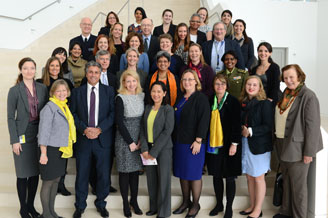Reinforcing the Women, Peace and Security agenda
In November, the NATO Science for Peace and Security (SPS) Programme supported two events designed to enhance the implementation of United Nations Security Council Resolution (UNSCR) 1325 and related resolutions. More than 120 military and civilian experts from Allied and partner countries examined ways to move forward with the Women, Peace and Security agenda.

Copyright CF Frizon CAPA
The implementation of UNSCR 1325 and related Resolutions represents an important policy priority for NATO and partner countries.
"NATO has been at the forefront in its policy statements regarding UNSCR 1325. The key now is implementation by individual member and partner countries," remarks Dr Chantal de Jonge Oudraat, President of Women In International Security (WIIS).
Assessing progress: the 1325 Scorecard

Photo courtesy of USIP
On 6 and 7 November, a workshop to establish a tool for assessing how gender perspectives are integrated into national security policies took place in Washington, D.C. It was the second in a series of three workshops which make up a project known as “The 1325 NATO Scorecard: Gender Mainstreaming: Indicators for the implementation of UNSCR 1325 and its related Resolutions”.
The project is designed to define a set of indicators for assessment in each of the four areas set out in UNSCR 1325: prevention, participation, protection, and relief and recovery. Measures implemented by NATO countries and partners in the context of the Resolution vary, making it difficult to assess progress, particularly in the NATO context. The NATO 1325 Scorecard will assess how NATO and partner countries are mainstreaming gender in military operations. The results will facilitate standardization in training, implementation, and monitoring and evaluation of the Women, Peace and Security agenda in NATO-led missions and operations.
"What makes this project unique is that it brings together people from the security sector and civil society. Many of the civil society leaders present commented upon this unique characteristic of this project and workshop," said Kathleen Kuehnast, Director of the Center for Gender and Peacebuilding at the United States Institute for Peace (USIP).
Ambassador Catherine Russell, the Ambassador-at-Large for Global Women's Issues at the US Department of State addressed delegates, who included officials from NATO, Supreme Headquarters Allied Powers Europe (SHAPE) and the Nordic Center for Gender in Military Operations as well as representatives from civil society.
The first workshop was held on 26 and 27 May 2014 at the Belgrade Centre for Security Policy, Serbia. The results of the project will be presented at the third and final workshop in Brussels in 2015.
The workshops are organised by WIIS together with USIP and the Belgrade Centre for Security Policy (BCSP). The project was launched in 2013.
Women in the military: the importance of recruitment and retention
On 11 and 12 November, the SPS Programme supported a workshop at Rey Juan Carlos University in Madrid, Spain. The event launched a new project, led by Australia and Spain, designed to assess the impact of UNSCR 1325 on the armed forces of NATO and partner countries. Researchers will pursue a thorough analysis of the National Reports owned by the NATO International Military Staff (IMS) Office of the Gender Advisor that contain unclassified data on the position of women in the armed forces of NATO Allies and partners.
“This multi-national collaboration will enable NATO and its member nations to understand the critical importance of the recruitment and retention of women in their militaries,” says Elizabeth Broderick, Sex Discrimination Commissioner, Australian Human Rights Commission. “Based on the Australian experience the collaboration will enable nations to develop best practice strategies that achieve gender equality in their militaries and which will ultimately make their militaries more effective,” she adds.
This project will develop the means to analyse data from 2000-2013, identifying areas where NATO can improve as it pursues the goals of UNSCR 1325 and related resolutions. The report will include best practices and recommendations.
“The added value of this project is that civil society institutions, like universities and human rights entities, are working together with a political and military organisation like NATO. This cooperation represents a force multiplier for all actors involved in this project,” comments Jesus Gil Ruiz, IMS Gender Advisor.
NATO will publish the final results and submit them to the United Nations in 2015 on the occasion of the 15th anniversary of UNSCR 1325.
Continued support for UNSCR 1325
The SPS Programme is continuing its support for NATO’s Women, Peace and Security agenda. It has issued a call for proposals for workshops, training courses, and projects to be organised by scientists, experts, and policy-makers from NATO and partner countries to support the implementation of UNSCR 1325 and related resolutions.
“Civil society has repeatedly shown its commitment and leadership in this domain,” comments Michael Gaul, Senior Advisor at NATO. “I therefore hope that we can continue to develop opportunities – like these workshops – that bring together a diverse range of experts. NATO and its partners believe in the core role that women can play in building, consolidating and maintaining peace and security. The NATO SPS Programme works to support these efforts.”
The SPS Programme is a partnership tool in NATO’s Emerging Security Challenges Division.
